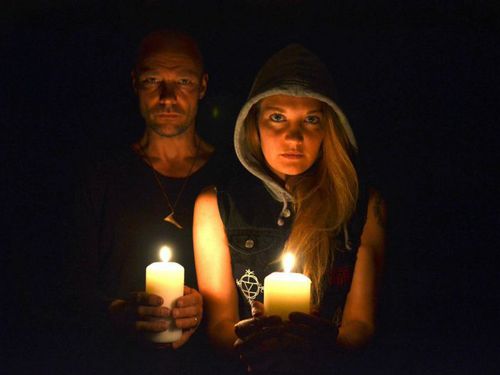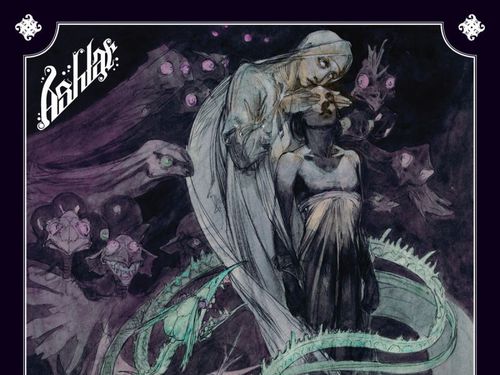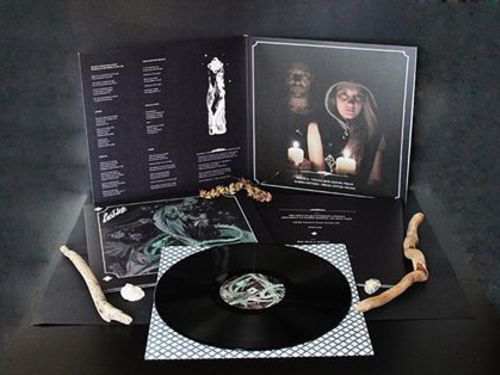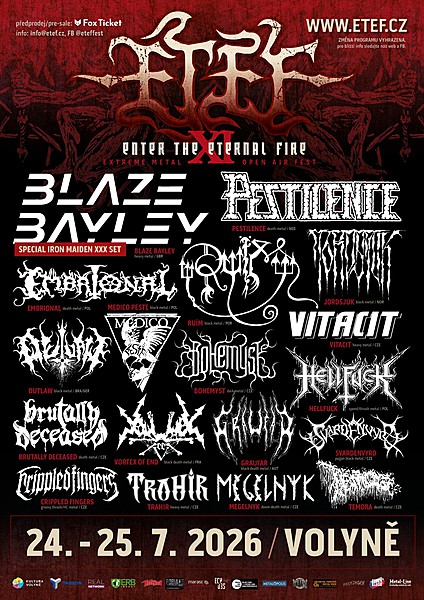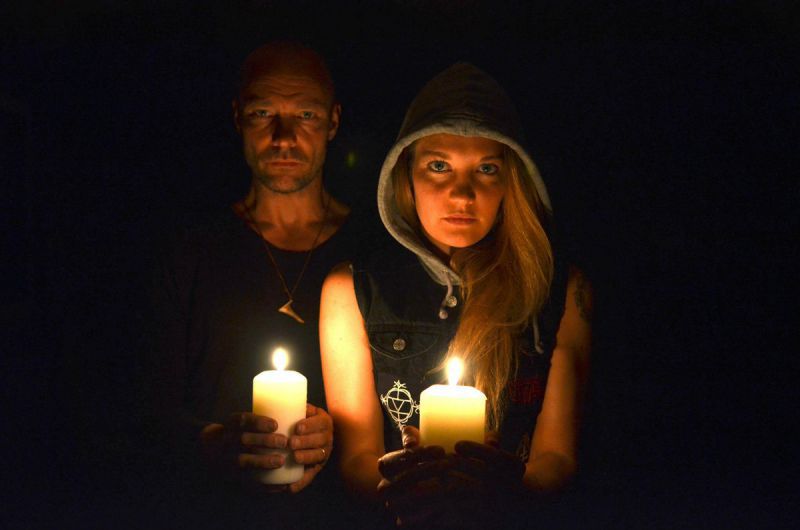
Hello ASHTAR, do you have any news for us? Are you working on some new material?
Marko: We're playing some gigs this summer and autumn, but we're not working on new material at the moment. I think we'll start with it in winter and hopefully go to the studio next summer or autumn.
It's been over a year since the release of your debut album «Ilmasaari». What acclaim did it receive? Are you content with it, now that some time has passed?
Witch N.: We got mostly positive, sometimes even enthusiastic feedback for the album. And we are very happy about that, because we didn’t expect it. But of course art is always a matter of taste and very personal, so even if you do a very good album, you won’t please everybody – especially in Germany there seemed to exist some reviewers who expected us to be either pure doom or heavy metal or just didn’t like our repetitive, quite monotone sound… Regarding your second question: I think it's the best possible album we could record at that certain time. I would never assert that it’s a perfect album, but yes, we are still very satisfied and proud of our work, and that’s a good feeling!
Putting a modified painting by Alfons Mucha on front cover is a great choice, his work has a huge impact – and it raises more than one eye in our country. In what way does this it impress you? Were there any problems with using the picture? I'm talking copyright issues etc.
N.: It was Sin, the guy who was responsible for our artwork, who came up with the idea of using this painting. We loved it from the beginning, because it represents in a wonderful way the atmosphere we want to create with our music: It’s sinister but beautiful, it’s not just black and white but magically colored and a bit bizarre. As to the copyright question, to be sincere we did not really think about it because it’s a modified painting and Mucha has been dead for more than 50 years…
Marko: Well, I've been waiting for a letter or a phone call 'til today, saying: «Hello, here is the Alfons Mucha copyright association, and we're just keeping your record in our hands…»
Your music is filled with dark vibe - you're utilizing and mixing sludge, doom, black metal... Why did you choose this approach? I don't want to accuse you of some trend-following, but after all there a lot of bands in the underground scene, who mix the same genres. But I like, that you have your own defined sound in this rank. Your music is interesting, almost hypnotic to my ears. And it have some catchy patterns despite the genres.
N.: The fact that Ashtar is playing blackened sludge doom – as we call it ourselves – is due to our musical past in doom bands over the years plus our personal taste. We like black metal and sludge, just as space rock and shoegaze. And of course we can’t deny being influenced by trends and new bands in the underground scene as well. I am especially exalted about one recent development in doom metal: The addition of black metal is interesting and enriching in my eyes, and on the other hand it’s good to see that formerly pure black metal listeners are becoming more open-minded for genres like doom metal.
Could you tell me, which albums and/or bands inspired you in similar genres? Or which ones have been interesting for you?
N.: I like bands like Glorior Belli, Aldebaran, Mosaic, Oranssi Pazuzu, Blut Aus Nord, Alkerdeel, Usnea, Azavatar, just to name a few…
Marko: My favourite bands in similar genres are Wolvserpent, Dark Buddha Rising, Inter Arma, Chaos Echoes and Saturnalia Temple.
ASHTAR is in its basics an unconventional band. You recorded the album as a duo, which is quite common, but the not-so-common fact is, that you're a pair on a personal level as well. I'm sure, you get asked this all the time, but how do you think the marriage and working together in a band affects you in the positive way?
N.: It's not that uncommon, if you think about bands like for example Wolvserpent, Jucifer or Pombagira – all duos who are married or in a relationship as well… Of course, it’s not the regular constellation, but I see mostly advantages in our case. Music is one of the biggest passions we share, and creating art together adds another dimension to our relationship. The combination of our characters has shown very fertile: «Ilmasaari» is the proof for it.
And are there any disadvantages as well?
Marko: Maybe it's hard to believe but beside having to organize a babysitter every time we play together there are absolutely no disadvantages in our case. We're a perfect team.
How do you compose your music? Is it the classic way of making a riff and then building the song around it? Do you have a concept of a song, or does something come up during improvisations?
N.: Yes, it’s mostly the classic way: The songs on «Ilmasaari» emerged from one or two riffs and jams in the rehearsal room. We always knew quite quickly if a riff had the potential to become a song or not. Then we defined the song structures and recorded it as a basis with one guitar, drums and lead vocals. At home, we listened to the recording and tried to add some bass lines and more guitars and vocals. The songs were not completely finished when we entered the studio though – «Celestial» for example developed mostly in the studio. That it turned out to be one of the most intense songs of the album was the proof for us that spontaneous creativity worked very well too.
Do you rehearse? Or just jam together when everybody has a time for it?
Marko: When we started four years ago we jammed a lot to get the feeling for each other musically. But as soon as the scetches became songs we rehearsed quite systematically to get prepared for the studio. And after that we also had to rehearse to get the material right for the stage with our different guest guitarists. So there has been quite a lot of straight rehearsing in the last two years – and I'm looking forward to some relaxed jamming again.
Violin and even didgeridoo can be heard on «Ilmasaari». What led you to use those instruments? Did you want to enrich the songs with something? In my opinion, it worked great. You're both multi-instrumentalists, but what instrument is the one you're most associated with? Is it guitar/bass for Witch N. and drums for Marko?
Marko: The violin was quite a natural thing for us to incorporate in our music, because Witch N. had been playing violin since she was a child – and she also played some violin in her former doom band shEver. The didgeridoo thing happened more by accident. I have a didgeridoo standing around in a corner and when we were recording «Collide» I just fooled around with it – and realized that the tone matched exactly. So I recorded that in the studio. My main instrument are the drums, Witch N.'s is the bass. But we both also played the guitars in the studio, which was a very satisfying thing.
Live shows are not unknown to you. That requires a complete band. Your line-up includes very active Frederyk Rotter, but what about other musicians? Is it hard to find people to play with you?
N.: It’s not easy to find the right people, because Basel is a small town. Almost every guitarist we know is already involved in one or more bands. But luckily, Matthias Edel started to play with us as live guitarist from the very beginning. As Frederyk obviously had not that much time due to his other projects and his label we looked for another live guitarist last year. Beside Matthias and Frederyk, Hannes Reitze is now playing the guitar as well at certain concerts. He is also member of the swiss doom metal band Excruciation from Zurich.
And how do you two feel on stage as a regular band, playing songs composed by the two of you?
Marko: We're used to that, because we've been playing live for a while now. At the moment it seems even more natural to us to be quartet on stage than playing as a duo.
Have you ever played with an idea of making ASHTAR into regular, four or five-member band? Why did you start as a duo?
Marko: We started as a duo, because we both wanted to do our own songs and arrangements without discussions or compromise with other songwriters or singers. And we both wanted to do more than just playing the drums or the bass like we'd done in other bands. But yes, we've thought about making Ashtar a regular four-piece since then. We're open for that but we're not in a hurry to make any decisions. Maybe we'll stay a duo. Time will tell.
From what I learned, you have a little child. I know, it's tough to mix family life and a band, especially when it comes to playing live. Are live shows currently out of the question, or are you able to combine family and touring?
N.: As we started to do our first live shows in 2015, I was already pregnant. Then we had a baby break during the summer and started to play live again, when our son was about six months old. Playing live now is always a question of organization, and sometimes it seems to take too much effort, but for the moment it’s so important for us to play that we are willing to invest a lot of energy to make it possible. At one gig in Switzerland we even took our son and a nurse with us. We carried him around in the club, and when we entered the stage, he was sleeping in the band bus…
«Ilmasaari» was published by Frederyk's label. What's his label like? Is it a good choice for a band like you?
Marko: His label is quite small but has a very good distribution. And it's kind of a family affair for us, because we've known Fredy for a long time and we trust him. We prefer to be a big player on a small label than a small player on a big label, most of all now that we're still a new band.
And what is your opinion on Frederyk? What kind of person is he? He looks like one of the most active people on the Swiss scene. His band ZATOKREV, his label, his helping other bands…
Marko: He's a very nice and passionate guy – and yes, he's very active and helping.
The album was released on many formats – CD, vinyl and even MC. By the way, the title artwork must look great on vinyl! Did you intent to release «Ilmasaari» on vinyl and tape? Or did you get a hard-to-pass offer? Are you fans of these recently nearly dead formats?
Marko: Our intention was from the beginning to release «Ilmasaari» on vinyl, because we love that format. And we got the deal for the vinyl edition with Throne Records from Spain before we knew where we'd release the other formats. Then the French label Antiq wanted to do the tape version. And eventually the CD came out on Fredy's label Czar of Bullets.
The album has a very interesting sound. I know, you were recording in Switzerland, but the final mix was done by Greg Chandler (ESOTERIC, LYCHTGATE). Did you tell him your sound demands, or was he able to act on his own? How was the collaboration?
N.: We knew Greg from musical collaborations in the past. For «Ilmasaari» he did some rough mixes on his own first – with just some short indications of how we imagined the sound of ASHTAR. Then we gave our demands to change sounds or to adjust volumes. So the album bears for sure the marks of Greg, but he wasn’t the producer really. We did interact via social media and internet and it worked quite well like this. We even listened to some rough mixes while being in Italy for summer holidays…
Your lyrics are in English, except the first track, which is in French. What led you to choose different language for the song?
N.: I always had a passion for the French language, maybe because both my grandfathers are French. Plus I studied French language and literature at the university. Last but not least I think it’s a very suitable language for screams and growls.
ASHTAR are presented as a Swiss band, but honestly, the name Marko Lehtinen does not sound very Swiss to my ears... Am I onto something?
Marko: You're right, originally I come from Finland. And the title «Ilmasaari» is Finnish, by the way. It means island of the skies.
You're from Basel, what would you say about this city? Any characteristics? What's it like for living?
Marko: Basel is quite a small city, typical Swiss, clean, wealthy and rich. But because of its chemical industry and its humanistic and artistic tradition it's quite an international and intellectual town too. And there is also quite much culture around compared to the size of the town – with some very good metal bands like Zatokrev and Schammasch for example. So, in the whole Basel is not paradise on earth, but it's quite an okay place to be.
What's the music scene in Switzerland? Are you interested in local bands? Could you recommend some?
N.: There is quite a rich scene in this little country, and there have been consistently a few very interesting and pioneer metal bands such as Celtic Frost, Samael or Coroner. As to active bands, I’d like to mention Triptykon, Bölzer, Antiversum, Rorcal and Borgne.
Marko, aside from ASHTAR you're active in a doom band PHASED. You recorded an album with them last year. What's the status of the band now? And are you able to handle both bands?
Marko: Phased and Ashtar are two complete different things for me. With Phased I've been playing for 15 years now, so it's become a part of me in a way. On the other hand the future belongs to Ashtar, it's new and exciting. At the moment I can still handle both bands, but maybe not forever.
The festival season is right around the corner. Will you pop up on some interesting festivals?
N.: We will play at the 19th edition of the Under The Black Sun Festival near Berlin, Germany, on June 30th. We’re looking forward to that a lot!


